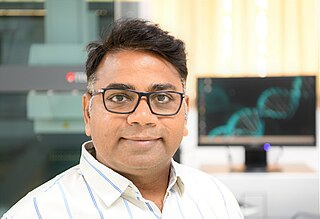
The International Institute of Tropical Agriculture (IITA) is a nonprofit organization that works with partners to enhance crop quality and productivity, reduce producer and consumer risks, and generate wealth from agriculture, with the ultimate goals of reducing hunger, malnutrition, and poverty. IITA's research-for-development (R4D) focuses on addressing the development needs of tropical countries. The institute was established in 1967 and headquarters located in Ibadan, Nigeria, with several research stations spread across Africa. The organization is governed by a Board of Trustees, supported by several countries and the Consultative Group on International Agricultural Research (CGIAR).

The International Maize and Wheat Improvement Center is a non-profit research-for-development organization that develops improved varieties of wheat and maize with the aim of contributing to food security, and innovates agricultural practices to help boost production, prevent crop disease and improve smallholder farmers' livelihoods. CIMMYT is one of the 15 CGIAR centers. CIMMYT is known for hosting the world's largest maize and wheat genebank at its headquarters in Mexico.

The International Rice Research Institute (IRRI) is an international agricultural research and training organization with its headquarters in Los Baños, Laguna, in the Philippines, and offices in seventeen countries. IRRI is known for its work in developing rice varieties that contributed to the Green Revolution in the 1960s which preempted the famine in Asia.

CGIAR is a global partnership that unites international organizations engaged in research about food security. CGIAR research aims to reduce rural poverty, increase food security, improve human health and nutrition, and sustainable management of natural resources.

The Center for International Forestry Research (CIFOR) is a non-profit scientific research organization that conducts research on the use and management of forests with a focus on tropical forests in developing countries. CIFOR, which merged with World Agroforestry on Jan. 1, 2019, is the forestry and agroforestry research center of CGIAR, a network of 15 research centers around the world that focus on agricultural research for sustainable development, working closely with governments and other partners to help develop evidence-based solutions to problems related to sustainable agriculture and natural resource management.

The International Crops Research Institute for the Semi-Arid Tropics (ICRISAT) is an international organisation which conducts agricultural research for rural development, headquartered in Patancheru, Hyderabad, Telangana, India, with several regional centres and research stations . It was founded in 1972 by a consortium of organisations convened by the Ford- and the Rockefeller- foundations. Its charter was signed by the FAO and the UNDP.

Worldwide more human beings gain their livelihood from agriculture than any other endeavor; the majority are self-employed subsistence farmers living in the tropics. While growing food for local consumption is the core of tropical agriculture, cash crops are also included in the definition.

The Crop Trust, officially known as the Global Crop Diversity Trust, is an international nonprofit organization with a secretariat in Bonn, Germany. Its mission is to conserve and make available the world's crop diversity for food security.
Colin Louis Avern Leakey was a leading plant scientist in the United Kingdom, a Fellow of King's College, Cambridge and of the Institute of Biology, and a world authority on beans.

Bioversity International is a global research-for-development organization that delivers scientific evidence, management practices and policy options to use and safeguard agricultural biodiversity to attain global food- and nutrition security, working with partners in low-income countries in different regions where agricultural biodiversity can contribute to improved nutrition, resilience, productivity and climate change adaptation. In 2019, Bioversity International joined with the International Center for Tropical Agriculture to "deliver research-based solutions that harness agricultural biodiversity and sustainably transform food systems to improve people's lives". Both institutions are members of the CGIAR, a global research partnership for a food-secure future.
Crop diversity or crop biodiversity is the variety and variability of crops, plants used in agriculture, including their genetic and phenotypic characteristics. It is a subset of a specific element of agricultural biodiversity. Over the past 50 years, there has been a major decline in two components of crop diversity; genetic diversity within each crop and the number of species commonly grown.
The World Vegetable Center (WorldVeg), previously known as the Asian Vegetable Research and Development Center (AVRDC), is an international, nonprofit institute for vegetable research and development. It was founded in 1971 in Shanhua, southern Taiwan, by the Asian Development Bank, Taiwan, South Korea, Japan, the Philippines, Thailand, the United States and South Vietnam.

Rajeev Kumar Varshney is an Indian agricultural scientist, specializing in genomics, genetics, molecular breeding and capacity building in developing countries. Varshney is currently serving as Director, Western Australian State Agricultural Biotechnology Center; Director, Centre for Crop & Food Innovation; and International Chair in Agriculture & Food Security with the Food Futures Institute at Murdoch University, Australia since Feb 2022. Before joining Murdoch University, Australia he served International Crops Research Institute for the Semi-Arid Tropics (ICRISAT), a global agriculture R&D institute, for more than 16 years in different scientific and research leadership roles including Research Program Director for three global research programs– Grain Legumes, Genetic Gains and Accelerated Crop Improvement Program. He has the onus of establishing and nurturing the Center of Excellence in Genomics & Systems Biology (CEGSB), a globally recognized center for genomics research at ICRISAT that made impacts on improving agriculture and development of human resources in several countries including India, China, Kenya, Ethiopia, Tanzania, Nigeria, Ghana, Mali, Senegal, Burkina Faso, etc. Varshney holds Adjunct/Honorary/Visiting Professor positions at 10 academic institutions in Australia, China, Ghana, Hong Kong and India, including The University of Western Australia, University of Queensland, West Africa Centre for Crop Improvement, University of Hyderabad, Chaudhary Charan Singh University and Professor Jayashankar Telangana State Agricultural University.
Bela "Bert" Grof was a Hungarian-born Australian agricultural researcher with contributions to grassland and forage research in the tropics.
Derrick Thomas was a British agricultural researcher with special contributions to grassland and forage research in the tropics.

Barbara Pickersgill is a British botanist with a special interest in the domestication of crops, the genetics, taxonomy, and evolutionary biology of cultivated plants, and the preservation of crop diversity. Her 1966 dissertation for the degree of Doctor of Philosophy from Indiana University concerned the taxonomy of Capsicum chinense. Her doctoral advisor was Charles B. Heiser.

Marion Guillou is a French scientist specialized in global food security.

Neustanthus is a monotypic genus of flowering plants belonging to the pea family Fabaceae and its tribe Phaseoleae. The only species is Neustanthus phaseoloides, called tropical kudzu. This species is a forage crop and cover crop used in the tropics. It is known as puero in Australia and tropical kudzu in most tropical regions.
Genesys is an online, global portal about plant genetic resources for food and agriculture. It is a gateway from which germplasm accessions from gene banks around the world can be easily found and ordered.

Geoffrey Hawtin OBE is an agricultural scientist and World Food Prize laureate who has served in public institutions working in agricultural biodiversity, plant genetic resources, crop breeding and research management. He was awarded an OBE by Queen Elizabeth II and has been recognized for his career "dedicated to using agriculture as a weapon in the war against poverty in developing countries." He played key roles in the creation of the Svalbard Global Seed Vault and the negotiation of the International Treaty on Plant Genetic Resources. He has headed two CGIAR Research Centers and currently is on the Executive Board of the Crop Trust.














